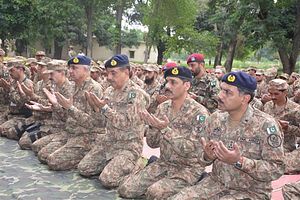Over 80 people lost their lives and over 200 were wounded in multiple bombings in Pakistani cities of Quetta and Parachinar on Friday.
The terror attacks coincided with Jumma-tul-Wida (the Farewell Friday) as the final Friday of the holy month of Ramzan (alternatively spelled Ramadan) is known. Quetta, the provincial capital of the volatile Balochistan province, and Parachinar, capital of Kurram Agency, a semi-autonomous districts of Federally Administered Tribal Areas (FATA), were both targeted.
Pakistani Chief of Army Staff General Qamar Javed Bajwa’s immediate response to the bombings was that the “festive mood” of the nation was the intended target, with Eid al-Fitr just a couple of days away.
Meanwhile, Prime Minister Nawaz Sharif said “no Muslim can ever imagine to commit such horrific act” [sic] during Ramzan. President Mamnoon Hussain dubbed the perpetrators the “last remnants of terrorism” in the country, while Interior Minister Chaudhary Nisar Ali Khan said he would “pray for the victims.”
The media wing of the Army was quick to link the attacks to “sanctuaries across the border,” implying the claim made after every attack: that the militants came from Afghanistan and were funded by the Indian intelligence agency Research & Analysis Wing.
The Quetta attack was claimed by the jihadist group Jamaat-ul-Ahrar (JA), a splinter group affiliated with the Pakistan Taliban that has paid allegiance to the Islamic State. Lashkar-e-Jhangvi (LeJ) claimed responsibility for the twin bombings in Parachinar.
Parachinar, which has been under strict security alert, is no stranger to jihadist terror. On March 31, JA targeted a Shia mosque in the city, killing 23, while the LeJ – which is also aligned with the Islamic State – bombed a market in the city on January 21, leaving 25 dead.
Terror in Parachinar isn’t a recent phenomenon either, with the city having experienced high profile attacks in February 2008, February 2012, September 2012, July 2013, and December 2015, before the surge in violence this year. Following the December 2015 attack, which was also claimed by LeJ, the jihadist group’s spokesman said: “This is revenge for the killing of Muslims by the Syrian president and Iran.”
Shia Muslims, who form a majority in Kurram Agency, have been the direct target of many of the attacks launched by Sunni jihadist groups like the Pakistani Taliban, JA, or the LeJ. LeJ in particular has its raison d’etre as an anti-Shia organization, with ethnic cleansing of the community part of the group’s manifesto.
While sectarian tensions in Kurram go all the way back to pre-Partition British India, the Taliban siege of Parchinar in 2007 has been followed by a decade of massacres, with the Shia community bearing the brunt of it. To label the latest offshoot of a decades-long quest for Shia genocide as just another act of violence intended to ruin Eid celebrations — as Pakistan officials did — isn’t just blatantly insensitive. It also shuns the ideological roots of the jihadist problem, which not only engulfs the Shia and other religious minorities, but mainstream Sunnis as well.
Contrary to Sharif’s endeavor to apostatize the jihadists – reciprocating their excommunication of the Muslims that diverge from their ideology, especially the Shia Muslims – it is perfectly understandable why the bombings were orchestrated in Ramadan, the Muslim holy month, which frequently witnesses a surge in terror across the world.
Following the Manchester bombing last month ISIS urged “Muslim brothers in Europe” to “not despise the work. Your targeting of the so-called innocents and civilians is beloved by us and the most effective, so go forth and may you get a great reward or martyrdom in Ramadan.”
Ramadan is revered by many as a month of great conquests amidst the advent of Islam, with “jihad and martyrdom” considered the worthiest.
The jihadists – currently spearheaded by the Islamic State – are waging a holy war on the rest of us, primarily those Muslims who do not conform to their version of Islam. And so, it should no longer surprise anyone that they choose the holy Islamic month for their jihad.
Instead of declaring them non-Muslims, the Pakistani state, and the rest of the world, needs to comprehend the jihadist’s understanding of being a Muslim, including their literal interpretation of Islam, and facilitate reform through a counter-narrative. Where Pakistan currently stands on Islamic reform, and religious law’s fusion with the state, can be gauged by the recent death sentence handed down for digital blasphemy.
Until the state starts acknowledging that the target of jihad aren’t road networks, cricket matches, or Eid celebrations, the surge of terror cannot be eliminated.
The jihadists, along with the facilitation of radical Islamists, simply want to impose Sharia law and outlaw anything they deem un-Islamic, which could include the very existence of a democratic state. It is this denialism that has allowed the Islamic State inside Pakistan, with the group’s foot soldiers fulfilling the group’s commandments for a bloody Ramzan.

































